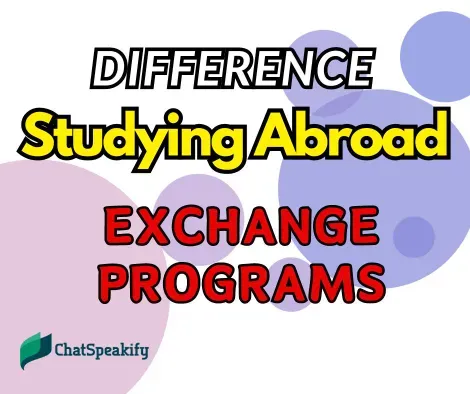Introduction: A Tale of Two Adventures
Imagine standing in the bustling streets of Tokyo, navigating a new culture and language. For Sarah, a college student from New York, this wasn’t just a vacation—it was a life-changing experience as part of her study abroad program. Meanwhile, her friend Mark was living with a host family in France, attending a local high school through an exchange program. These two friends had different paths but shared a common goal: to broaden their horizons. Let’s dive into the differences between studying abroad and exchange programs.
What is Studying Abroad?
Immersive Academic Experience
Studying abroad typically involves enrolling in a foreign university for a semester or more. These programs are often organized by your home institution and offer a chance to take courses that may not be available back home. For example, Sarah took part in a program where she studied Japanese language and culture while earning credits towards her degree.
Benefits of Studying Abroad
-
Academic Growth: You get to explore new academic fields and study with international experts.
-
Cultural Immersion: Living in a different country exposes you to new traditions, food, and ways of life.
-
Personal Development: Navigating a foreign country helps build independence and confidence.
Potential Challenges
-
Cost: Studying abroad can be expensive, with tuition, travel, and living expenses.
-
Adaptation: Adjusting to a new education system and culture can be challenging.
What are Exchange Programs?
Cultural Exchange and Personal Growth
Exchange programs often include switching places with a student from another nation. These programs are more frequent in high schools and emphasize cultural exchange. Mark, for example, spent a year in France, living with a host family and attending a nearby school. This intensive event emphasized personal and cultural growth rather than academics.
Benefits of Exchange Programs
-
Cultural Exposure: Living with a host family provides a deep dive into the local culture.
-
Language Skills: Constant interaction with native speakers significantly improves language proficiency.
-
Global Connections: You form lasting relationships and networks with people from around the world.
Potential Challenges
-
Homesickness: Being away from home for an extended period can be tough, especially for younger students.
-
Cultural Differences: Adapting to different customs and lifestyles can be difficult.
Making the Choice: Which is Right for You?
Consider Your Goals
If your primary focus is on academics and you want to earn credits towards your degree, studying abroad might be the better option. It offers structured programs with a strong academic component.
However, if you’re more interested in cultural exchange and personal growth, an exchange program could be the way to go. It provides an immersive experience in a different culture and helps develop language skills and global connections.
Financial Considerations
Studying abroad can be costly, but scholarships and financial aid are often available. Exchange programs might be more affordable since they often include room and board with a host family.
Duration and Timing
Studying abroad programs can range from a few months to a year, depending on your academic schedule. Exchange programs are typically a semester or a year long, often during high school years.
Personal Stories: Real-Life Experiences
To give you a better idea, let’s revisit Sarah and Mark’s stories:
-
Sarah’s Study Abroad Experience: “Studying in Tokyo was incredible. I loved my courses on Japanese art and history. The city itself was a classroom—every day was an adventure.”
-
Mark’s Exchange Program Journey: “Living with a French family was eye-opening. My host family taught me so much about French culture, and my language skills improved dramatically. It was challenging at first, but I wouldn’t trade the experience for anything.”
Conclusion: Embrace the Adventure
Both study abroad and exchange programs provide unique and useful experiences. Whether you want to improve your academic skills or immerse yourself in culture, these programs can help you grow personally and professionally. Take the time to assess your goals, financial circumstances, and desired experience. Whatever path you take, you’re in for an incredible experience. So, pack your bags, get out of your comfort zone, and let the adventure begin!
References
-
Institute of International Education. (2020). Open Doors Report.
-
Council on Standards for International Educational Travel. (2021). CSIET Standards .
